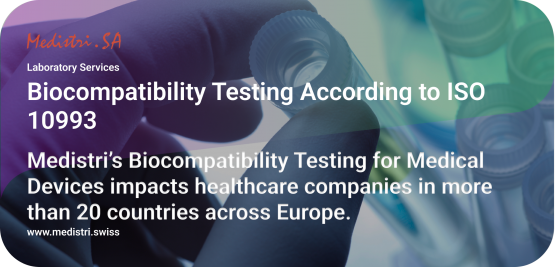Medistri provides Biocompatibility Testing for Medical Devices
Key points:
• Medistri’s Biocompatibility Testing for Medical devices impacts healthcare companies in more than 20 countries across Europe.
• Medistri’s customers get a deeper insight of the compatibility of their medical devices with a biological system.
• Medistri’s Laboratory works hand-in-hand to help manufacturers meet biocompatibility testing requirements of the International Organisation for Standardisation (ISO), U.S. Food and Drug Administration (FDA) and American Society for Testing and Materials (ASTM).
The company’s laboratory provides Biocompatibility Testing for Medical Devices according to ISO 10993. Working primarily with customers across Europe in Austria, Belgium, Finland, France, Germany, Greece, Ireland, Italy, Norway, Denmark, Israel, Switzerland, Luxembourg, Croatia, the Netherlands, Portugal, Hungary, and the UK. Medistri’s Biocompatibility Testing according to ISO 10993 enables customers to assesses the compatibility of their medical devices with a biological system, giving customers a deeper understanding of the interaction between the device and the various types of living tissues and cells that are exposed to the device when it comes into contact with patients.
ISO 10993 states that “The biological evaluation shall be planned, carried out, and documented by knowledgeable and experienced professionals.”
Medistri’s laboratory takes into consideration the materials, processing, and historical use of the device. This allows for a comprehensive assessment of biological responses for each medical device concerning its safety. The main objective of biocompatibility testing is the protection of man against potential biological hazards by the use of medical devices through a biological evaluation, compilation of historical data, and reference tests. This allows to perform a comprehensive assessment of biological responses for each medical device in relation to its safety. The biocompatibility tests reflect up to 8 different biological effects (themselves divided into different targeted tests). The type of test to be performed among the eight categories is closely related to the use of the medical device.
• Cytotoxicity according to ISO 10993–5
• Genotoxicity according to ISO 10993–3 & FDA
• Irritation according to ISO 10993–10
• Sensitisation according to ISO 10993–10.
• Systemic Effects of Systemic Toxicity and Pyrogenicity according to ISO 10993–11 and ASTM
• Implantation according to ISO 10993–6
• Chemical Characterisation according to ISO 10993–18
• Toxicological Risk Assessment according to ISO 10993–17
• Sterility Testing according to ISO 11737 series
• Sterile Barrier System according to ISO 11607 & EN 868 series
Medistri’s Laboratory provides the tests required to verify biocompatibility differ by type of device (surface contact, implantable), type of contact (skin, mucous membrane, wound area, tissue, bone, dentine, bloodstream, blood…), the contact time (limited, prolonged or permanent) and the historical data existing on the material used.
There is a growing number of innovative healthcare companies that are using Medistri’s Biocompatibility testing performed according to ISO 10993.
🎯 To learn more about our Biocompatibility Testing according to ISO 10993 services, visit on our website at www.medistri.swiss/en or directly contact our team at [email protected].
— The Medistri Team
#Medistri
